|
|
|
Sort Order |
|
|
|
Items / Page
|
|
|
|
|
|
|
| Srl | Item |
| 1 |
ID:
151048
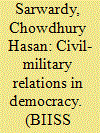

|
|
|
|
|
| Summary/Abstract |
Civil-Military relations are an age-old phenomenon. It involves a multiplicity of relationship between civilian authorities and military institutions of a country. Since the 20th century, civil-military relations have been developing as an important area of study to understand the interactions between the two entities. Many scholars like Samuel P. Huntington and Morris Janowitz have tried to analyse civil-military relations in the context of political approaches and social fabrics of a country. The theoretical developments to understand civil-military relations are also noteworthy. The Post-Modernist Theory as well as the Democratic Peace Theory is relevant to understand civil-military relations in the context of contemporary developments. In modern democratic societies, civil-military relations are considered as a sine qua non for proper functioning of democratic institutions where military establishment remains under the full control of civilian authority and contributes in aid to civilian administration when necessary. However, the experiences of civil-military relations are not same in all the countries. Developing an effective civil-military relation still remains a challenge for many countries. Since independence in 1971, Bangladesh has experienced a lot of challenges to develop an effective framework in this regard. In this backdrop, the present paper is an endeavour to understand civil-military relations in the context of democracy as well as to make an assessment regarding the civil-military relations in Bangladesh. The findings of the paper are that the idea of civil-military relations is still evolving and to maintain a democratic order, a country needs to develop cohesive relations between civilian authority and military administration. Bangladesh has achieved a lot in the civil-military relations, but still faces a number of challenges in this regard. The country needs to address such challenges to ensure effective democratic functioning of the country.
|
|
|
|
|
|
|
|
|
|
|
|
|
|
|
|
| 2 |
ID:
114153
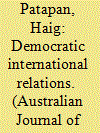

|
|
|
|
|
| Publication |
2012.
|
| Summary/Abstract |
The article examines the extent to which Montesquieu's doux commerce thesis, which claims that commerce leads to softening of manners and therefore favours international peace, presents a challenge to democratic peace theory. It argues that Montesquieu's claim that peace may be due to commerce, and not democracy, provides a theoretical challenge to those scholars who argue that there is a Kantian virtuous triangle of democracy. The practical implication of this theoretical challenge concerns the way democratic peace theory has influenced the practice of international politics, especially American foreign policy. The article argues that Montesquieu's doux commerce thesis mediates between the contending claims of realism and liberal internationalism over the merits of democratisation as an essential means for securing peace.
|
|
|
|
|
|
|
|
|
|
|
|
|
|
|
|
| 3 |
ID:
114155
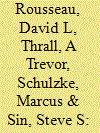

|
|
|
|
|
| Publication |
2012.
|
| Summary/Abstract |
Despite strong empirical evidence for democratic peace theory, the historical record indicates that democracies have been involved in many wars. This article conducts a critical examination of how democratic polities become entangled in international conflict. The examination focuses on how democratic leaders manage domestic politics and public opinion at each stage of the conflict (i.e. disputes, crises, wars and settlement). The study explores how democracies are drawn into conflict; when democracies provoke conflict; what claims democratic leaders make to justify conflict; when domestic audiences support or oppose conflict; and the implications for democratic leaders after conflicts. It argues that democratic leaders pursue various strategies that are shaped by the stage of the conflict, the domestic institutional structure and the level of mobilised domestic opposition.
|
|
|
|
|
|
|
|
|
|
|
|
|
|
|
|
| 4 |
ID:
071928
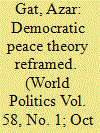

|
|
|
|
|
| Publication |
2005.
|
| Summary/Abstract |
This article argues that the democratic peace theorists have overlooked the defining development that underlies that peace of the nineteenth and twentieth centuries: the industrial-technological revolution. Not only did that revolution make democracy on a country scale possible; it also made all the countries that experienced the revolution-democratic and nondemocratic-far less belligerent in comparison with preindustrial times. The democratic peace did not exist among premodern democratic and republican city-states, not because they were not democratic or liberal enough but because they were premodern. Other factors that have emanated from the modern transformation and may generate greater aversion to war apply mostly to liberal democratic countries while being only variably connected to their regime. Such factors include the staggering rise in the standard of living; the decrease in hardship, pain, and death; the dominance of metropolitan life and the service economy; the spread of the consumer and entertainment society; sexual promiscuity; women's franchise; and the shrinking ratio of young males in the population.
|
|
|
|
|
|
|
|
|
|
|
|
|
|
|
|
| 5 |
ID:
074410
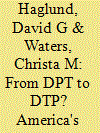

|
|
|
|
|
| Publication |
2005.
|
| Summary/Abstract |
This article asks whether the differing manner in which liberal-democratic allies perceive security threats might prove corrosive to their alliance. In effect, the authors seek to test the assumption that 'democratic alliances' and liberal-democratic security communities are virtually indestructible so long as the members remain liberal democracies. The case chosen for diachronic analysis is the collapse of Anglo-American-French comity in the immediate aftermath of the liberal-democratic allies' victory in the First World War. Argued here is that differential threat perception (or DTP) contributed significantly to the ending of meaningful security cooperation among the group. In this sense, DTP seems to have weakened the conceptual underpinning of the democratic alliance implied by democratic peace theory (or DPT).
|
|
|
|
|
|
|
|
|
|
|
|
|
|
|
|
| 6 |
ID:
096697
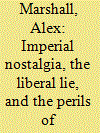

|
|
|
|
|
| Publication |
2010.
|
| Summary/Abstract |
Since 9/11, counterinsurgency is back in fashion; the 'war on terror' has even been branded a 'global counterinsurgency'. However the context within which counterinsurgency originally arose is critical to understanding the prospects for its present success; the radically changed environment in which it is currently being conducted casts into considerable doubt the validity of the doctrine's application by many national militaries currently 'rediscovering' this school of military thought today. Above all, classical counterinsurgency was a profoundly imperial, state-centric phenomenon; consequently it only rarely faced the thorny issue of sovereignty and legitimacy which bedevils and may doom these same efforts today.
|
|
|
|
|
|
|
|
|
|
|
|
|
|
|
|
| 7 |
ID:
114596
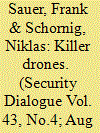

|
|
|
|
|
| Publication |
2012.
|
| Summary/Abstract |
This article sets out to probe the peculiar nexus between democracy and the military use of unmanned systems. To this end, it draws on a critical, 'antinomic' reading of democratic peace theory. Tying into the theoretical scope of research conducted within the democratic distinctiveness programme that emerged out of the democratic peace debate, this entails fathoming out the ways in which democracies are distinct from other regime types. It includes acknowledging that democracies deal with conflicts aggressively too, rather than naïvely taking their supposed general peacefulness at face value. We demonstrate that the same distinctly democratic set of interests and norms that is conventionally taken to be pivotal for democratic peacefulness yields both peaceful and belligerent behavior. That same democracy-specific set of interests and norms is also constitutive of the special appeal unmanned systems hold for democracies. While armed and eventually autonomous systems may thus seem like a 'silver bullet' for democratic decisionmakers today, we argue that, by relying on these systems in an attempt to satisfy the said interests and norms, democracies may end up thwarting them in the long run and render themselves only more war-prone.
|
|
|
|
|
|
|
|
|
|
|
|
|
|
|
|
| 8 |
ID:
164837
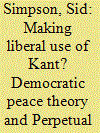

|
|
|
|
|
| Summary/Abstract |
The work of Immanuel Kant has been foundational in modern democratic peace theory. His essay Toward Perpetual Peace gives three prescriptions for attaining peace between democracies: republican institutions, a pacific union between states, and an ethos of universal hospitality. Contemporary democratic peace theory, however, has warped the Kantian framework from which it draws inspiration: the third prescription has been gradually substituted for commerce and trade. I argue that this change in emphasis produces tensions between Perpetual Peace and the body of democratic peace theory literature it spawned. Moreover, I contend that a look back at Kant’s essay sheds light on why this transformation occurred. Finally, I use this new look back at Perpetual Peace to reformulate the relationship between peace, democracy, and commerce so as to offer a new perspective on the democratic peace theory/capitalist peace theory debate.
|
|
|
|
|
|
|
|
|
|
|
|
|
|
|
|
| 9 |
ID:
101838


|
|
|
|
|
| Publication |
2011.
|
| Summary/Abstract |
Since the end of World War II, relations between Canadian and US leaders have become difficult, as the absence of the unifying force of war led to different political visions. However, on the whole, and in spite of a power differential that has grown since 1945, relations between Canada and the United States have nevertheless been good. How is this explained? In this reflection, rather than taking a structural-realist approach, we build on a perspective proposed by Stéphane Roussel in his theory on democratic peace between Canada and the United States. Roussel showed how the constructivist model could justify the absence of coercion and the relatively egalitarian cooperation between both states. While Roussel's studies refer only to the 1867-1958 period, we broaden the perspective to include the contemporary period and propose that the 'unsocial sociability' at the heart of Canadian-American relations is due to the recognition of the democratic nature of the other's regime and the implementation of institutional mechanisms and techniques.
|
|
|
|
|
|
|
|
|
|
|
|
|
|
|
|
| 10 |
ID:
190804
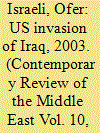

|
|
|
|
|
| Summary/Abstract |
This study will describe an indirect link of the US Invasion of Iraq (2003) and test how the US occupation of Iraq served, from an American perspective, as a derivative product with negative side effects several years later in the Middle East. In seeking to understand the dynamic of any event in foreign policy, political scientists need to be aware of the role and spread of key ideas and how they emerged, developed, and eventually influenced events. Accordingly, analysis of existing perceptions should also consider the critical impacts of past events and crises. “The power of the ideas,” as presented by the rebirth of the ancient idea of the Muslim Caliphate, was mostly covert throughout the years. However, understanding this event requires examining the formative influence of the US Invasion of Iraq (2003), which ended with the Islamic State taking power in Iraq and al-Sham (ISIS). This radical group has declared a Muslim Caliphate and claims control over a large area of Iraq and Syria.
|
|
|
|
|
|
|
|
|
|
|
|
|
|
|
|
|
|
|
|
|